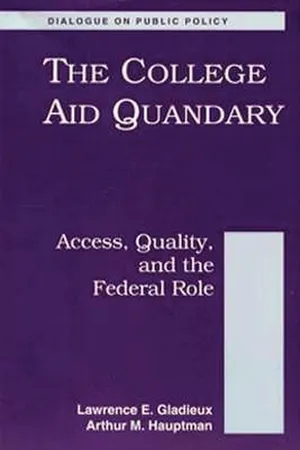
eBook - ePub
The College Aid Quandary
Access Quality and the Federal Role
- English
- ePUB (mobile friendly)
- Available on iOS & Android
eBook - ePub
About this book
Each year, millions of American families struggle with the expense of higher education. For the past fifty years, the U.S. government has helped students and families pay for college; but with the entire domestic policy agenda in flux, federal aid to education hangs in the balance. This book analyzes government policies for helping students pay for education beyond high school. It is being published at a time when aid to education is a prominent issue in battles over the federal budget and policymakers are debating the need for and effectiveness of federal student assistance programs. Starting with the post-World War II GI Bill, the book reviews the 50-year history of federal student aid legislation, assesses the results, and identifies trends and problems that cloud the future of this critically important national effort. The authors draw on the thinking of the country's top experts in examining the rationale and structure of the student aid system and how it might more effectively expand college opportunities while ensuring educational quality. Their analysis encourages policymakers to consider the multiple objectives of government aid—not just getting more students into college, but promoting student success and degree completion. The book offers a framework for future policy debates aimed at improving a system vital to America's economic future and its continued promise of opportunity. Copublished with the College Board / Dialogue on Public Policy
Frequently asked questions
Yes, you can cancel anytime from the Subscription tab in your account settings on the Perlego website. Your subscription will stay active until the end of your current billing period. Learn how to cancel your subscription.
No, books cannot be downloaded as external files, such as PDFs, for use outside of Perlego. However, you can download books within the Perlego app for offline reading on mobile or tablet. Learn more here.
Perlego offers two plans: Essential and Complete
- Essential is ideal for learners and professionals who enjoy exploring a wide range of subjects. Access the Essential Library with 800,000+ trusted titles and best-sellers across business, personal growth, and the humanities. Includes unlimited reading time and Standard Read Aloud voice.
- Complete: Perfect for advanced learners and researchers needing full, unrestricted access. Unlock 1.4M+ books across hundreds of subjects, including academic and specialized titles. The Complete Plan also includes advanced features like Premium Read Aloud and Research Assistant.
We are an online textbook subscription service, where you can get access to an entire online library for less than the price of a single book per month. With over 1 million books across 1000+ topics, we’ve got you covered! Learn more here.
Look out for the read-aloud symbol on your next book to see if you can listen to it. The read-aloud tool reads text aloud for you, highlighting the text as it is being read. You can pause it, speed it up and slow it down. Learn more here.
Yes! You can use the Perlego app on both iOS or Android devices to read anytime, anywhere — even offline. Perfect for commutes or when you’re on the go.
Please note we cannot support devices running on iOS 13 and Android 7 or earlier. Learn more about using the app.
Please note we cannot support devices running on iOS 13 and Android 7 or earlier. Learn more about using the app.
Yes, you can access The College Aid Quandary by Lawrence Gladieux,Art Hauptman in PDF and/or ePUB format, as well as other popular books in Politics & International Relations & Public Policy. We have over one million books available in our catalogue for you to explore.
Information
Table of contents
- Introduction
- 1. A Fifty-Year Retrospective on Federal Student Aid Policy
- 2. Toward the Next Century: Focusing the Debate
- 3. Conclusions: Seeking Guideposts for Reform
- Conference Panelists and Speakers
- Other Participants